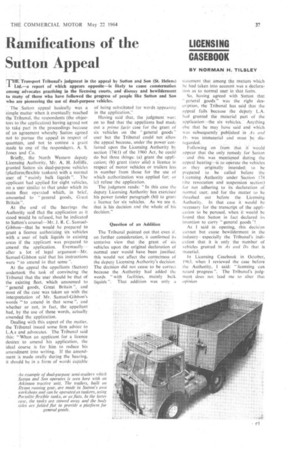Ramifications of the Sutton Appeal
Page 39

If you've noticed an error in this article please click here to report it so we can fix it.
THE Transport Tribunal's judgment in the appeal by Sutton and Son (St. Helens)
. Ltd.—a report of which appears opposite—is likely to cause consternation among advocates practising in the licensing courts, and dismay and bewilderment to many of those who have followed the progress of people like Sutton and Son who are pioneering the use of dual-purpose vehicles.
The Sutton appeal basically was a Sim* matter when it eventually reached the Tribunal, the respondents (the objecfors'to the aPplication) havirig agreed not to take part in the proceedings because of an agreement whereby Sutton agreed not to purSue the appeal in respect of quanturn,. and not to contest a grant Made to one of the respondents, A: S. Jones and Co.
Briefly, the North Western deputy Licensing Authority, Mr. A. H. Joltiffe, granted Sutton six dual-purpose vehicles (platform/flexible tankers) with a normal user of "mainly bulk liquids ". The applicant had applied for eight vehicles, on a user similar to that under which its main fleet operated which, in brief, amounted to "general goods, Great Britain".
At the end of the hearings the Authority said that the application as it stood would be refused, hut he indicated to Sutton's counsel—Mr. j, R. C. SamuelGibbon—that he would be prepared to grant a licence authorizing six vehicles with a. user of bulk liquids in existing areas if the applicant was prepared to amend the application. Eventually-after a lot of legal argument—Mr. Samuel-Gibbon said that his instructions were to amend in that sense".
At the appeal the appellants (Sutton) undertook the task of convincing the Tribunal that the user should be that of the existing fleet, which 'amounted to "general goods, Great Britain ", and most of the case was taken up with the interpretation of Mr. Samuet-Gibbon's words ." to amend in that sense", and whether or not, in fact, the appellant had, by the use of those words, actually amended the application.
Dealing with this aspect of the matter, the Tribunal issued some firth advice to L.A. and advocates. The Tribunal said this: "When an applicant for a licence desires to amend his application, the ideal Course is for him to reduce his amendment into writing. If the amendment is made orally during the hearing, it should be in a form of word § canable of being substituted for words appearirT in the application."
Having said that, the judgment went on to find that the appellants had made out a prima facie case for the grant of six vehicles on the "general goods" user but the Tribunal could not allow the appeal because, under the power conferred upon the Licensing Authority by section 174(1) of the 1960 Act,he could do but three things (a) grant the application; (b) grant (inter alia) a licence in respect of motor vehicles or trailers less in number from those for the use of which authorization was applied for; or (c) refuse the application.
The judgment reads: " In this case the deputy Licensing Authority has exercised his power (under paragraph (b)) to grant a licence for six vehicles. As we see it. that is his decision and the whole of his decision,"




























































































































